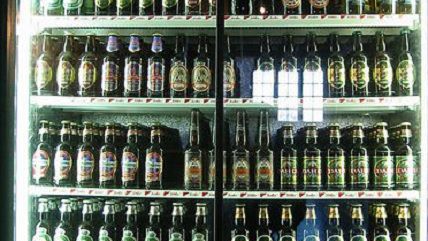These States Have the Highest and Lowest Alcohol Taxes

If there's one thing U.S. politicians love, it's a good old-fashioned sin tax. These days everything from soda to fireworks gets the sin tax treatment, but booze is the OG of unfairly taxed vices in America. And this shows no signs of abating, according to a new report from the Tax Foundation. The organization highlights how beer, wine, and spirits are taxed around the country, including which states have the highest and lowest alcohol taxes and whether these taxes increased or decreased last year.
Not many have been decreasing. In 2013, only a handful of states lowered taxes on beer, wine, or spirits, and most by miniscule amounts. The good news, I suppose, is that there weren't many booze tax hikes either. But that's little comfort considering how high some of these taxes already are.
In Washington state, for instance, residents pay an extra $35.22 per gallon to state coffers when they buy any sort of spirits. And crossing the border to neighboring Oregon won't help much—it boasts the second-highest spirit tax, at $22.73 per gallon. Rounding out the top five are Virginia ($19.19), Alabama ($18.23), and Alaska ($12.80).
The latter two states have the distinction of making it into the top five for highest taxes in all three alcohol categories. In Alaska, beer is taxed at $1.07 per gallon, second only to Tennessee, with a $1.17 per gallon beer tax. Alabama has the third highest beer-tax rate ($1.05 per gallon), followed by Georgia ($1.01), and Hawaii (93 cents).
And Kentucky takes top billing for wine taxes, adding an additional $3.56 per gallon to the price of wine. It's followed by Alaska ($2.50 per gallon), Florida ($2.25), Iowa ($1.75), and a tied Alabama and New Mexico ($1.70).
Only two states—Wyoming and New Hampshire—decline to tax spirits altogether. They also join Utah, Missouri, and Pennsylvania in keeping wine sin-tax free. But you'll find beer taxes in all 50 states and Washington, D.C. According to The Beer Institute, "taxes are the single most expensive ingredient in beer."
The Institute also notes that beer taxes are regressive.
"Instead of taxing equitably across all income groups, beer taxes place a much heavier burden on low- and middle-income taxpayers than on the rich. That's because many more beer drinkers are men and women with modest incomes rather than wealthy people.
An analysis by the Beer Institute found that households earning less than $50,000 per year pay half of all beer taxes, while accounting for less than one-fourth of all income earned in the U.S. Beer taxes are actually 6.5 times higher as a percent of income for lower-income households (those earning less than $20,000 per year) compared to higher-income households (earning $70,000+ per year). The tax on beer is thus one of the most discriminatory of all taxes in the federal and states' tax codes."
Since the Tax Foundation's 2013 report, only two states have lowered beer taxes (Washington state down from 52 cents to two cents; Minnesota down one cent). Twelve states decreased excise taxes on spirits, while one (Minnesota) slightly decreased its tax on wine.
Meanwhile four states (Mississippi, Montana, Utah, and Vermont) raised taxes on spirits. North Carolina, Arkansas, Kentucky, and D.C. all raised beer taxes (North Carolina by nine cents, the rest by two cents). North Carolina also hiked its wine tax by 21 cents per gallon, while Kentucky added 40 cents to its already prodigious wine tax.
The Tax Foundation notes that there isn't much consistency on how state and local governments tax alcohol. Some tax a fixed rate per volume; others mandate wholesale taxes that are a percentage of the product's price. Tax rates also include distributor taxes (generally structured as license fees), retail taxes and bottle fees.


Show Comments (48)